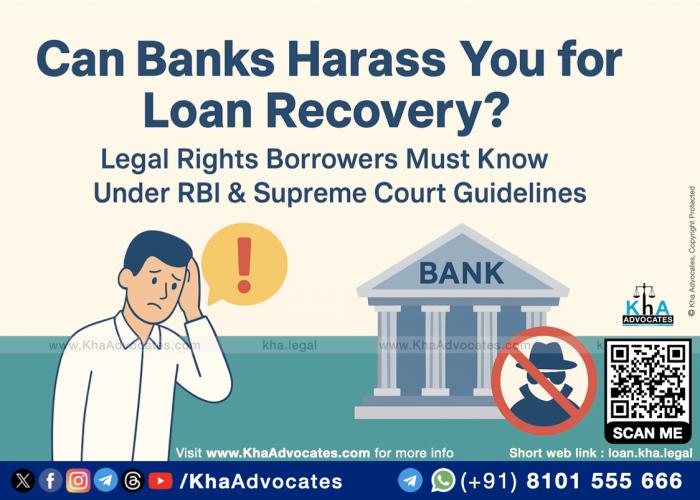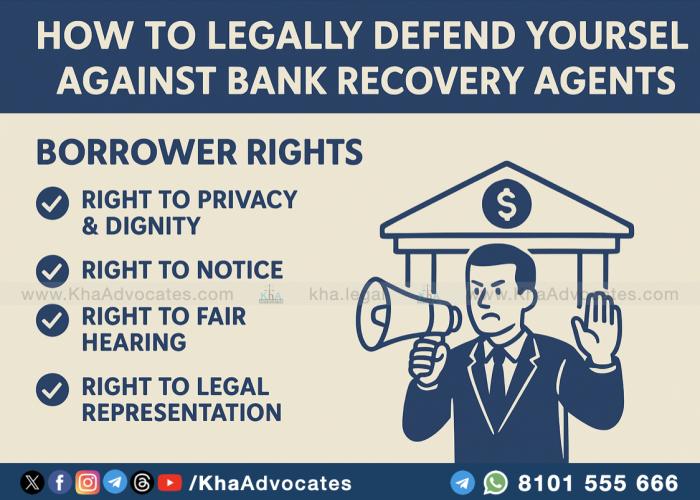
Published on: October 19, 2025 Author: Kabir Hassan, Lawyer
Taking out a loan is common in today’s India — whether for education, business, a home or vehicle. But what happens if you default or fall behind on repayments? While banks and lending institutions are legally entitled to recover dues, there’s a clear line between lawful recovery and harassment. This blog explains your rights as a borrower, what the regulatory and judicial safeguards are under the Reserve Bank of India (RBI) and the Supreme Court of India, how defaults affect your credit (for example via TransUnion CIBIL Limited), and how a lawyer specialising in borrower-protection can help you navigate recovery, negotiate with lenders and stop unfair practices.
Many borrowers panic when they are contacted by recovery agents or notices arrive. They may feel powerless. But the truth is: you do have rights. And knowing those rights — plus having a strategy for communication, restructuring or settlement — can make a big difference. It’s not just about avoiding trouble, it’s about protecting your dignity, your credit record and your future borrowing capacity.
When a borrower defaults, banks and NBFCs have the legal right to recover the money secured under contract. This may include: sending notices, calling you, eventually enforcing security (for secured loans) via laws such as the Securitisation and Reconstruction of Financial Assets and Enforcement of Security Interest Act, 2002 (SARFAESI Act) if applicable. For unsecured loans, the lender may initiate civil legal action or arbitration.
Harassment arises when recovery steps go beyond legal, ethical and regulatory boundaries. Some examples of prohibited practices under RBI guidelines and court judgments include:
Persistent phone calls or visits at odd hours (e.g., before 8 a.m. or after 7 p.m.), or on Sundays/holidays, without your consent.
Use of threats, intimidation, muscle power, public shaming or humiliation.
Disclosure of your loan default status to your friends, neighbours, colleagues or employer without your consent — thereby breaching your right to privacy and dignity.
Visiting your workplace or home unannounced and cut off from the recovery process’s due course.
Taking possession of assets without following the statutory steps, or seeking to coerce you into a settlement under threat.
In effect: banks & their agents may collect dues, but they must treat the borrower with dignity and follow due process. The RBI’s Fair Practices Code and circulars make this clear.
Under the Fair Practices Code for Lenders and the related Master Circulars, the RBI has advised banks: “in the matter of recovery of loans, the lenders should not resort to undue harassment viz. persistently bothering the borrowers at odd hours, use of muscle power for recovery of loans, etc.”
On 12 August 2022, the RBI issued guidelines on outsourcing of financial services (including recovery agents) that stipulate regulated entities (REs) must ensure their agents do not resort to intimidation or harassment of any kind.
Recovery agents are typically allowed to contact borrowers only in defined time slots (in many sources 8 a.m. to 7 p.m.) unless otherwise agreed; they must carry ID cards and have an authorisation letter from the bank.
The landmark case ICICI Bank Ltd. v. Shanti Devi Sharma (2008) [2008 7 SCC 532] held that banks cannot adopt strong-arm tactics or employ ‘muscle‐men’ for recovery; they must resort to lawful processes for enforcement of security/loan dues.
Courts have repeatedly held that the bank is vicariously responsible for the actions of its recovery agents; unlawful acts by agents can attract regulatory and criminal liability.
If you are being harassed by calls outside permitted hours, or by agents using intimidation, you have a remedy
.
You can approach the bank’s grievance cell, the Banking Ombudsman under the RBI’s scheme, and ultimately consumer forums or courts for relief.
Banks failing to adhere can face regulatory actions by the RBI and compensation orders via Ombudsman.
Even if you are correct and not being harassed, a default on loan repayments has implications:
Your credit score monitored by CIBIL (or other credit bureaus) can drop. Defaults, non-performing assets (NPAs) and settlements reflect in your credit history.
If you settle for a lesser amount (one-time settlement) your record may get a “Settled” or “Closed” tag rather than “Paid in full”, which may affect future loan or credit card approvals.
Follow-up harassment or asset‐seizure threats are often triggered not because the bank is “mean” — but because they want to recover before the loan becomes an irrecoverable NPA. Early action helps you negotiate better.
Lack of awareness can lead to signing away rights or accepting unfavourable terms under pressure, leading to loss of assets or worse credit consequences.
So, while you must protect your rights, you should also take a proactive stance: engage with your lender, seek restructuring, negotiate settlement options, and ensure your credit protein stays intact.
a) Stay calm and proactive.
Don’t ignore default. The earlier you engage the lender, the more options. Contact your loan officer or branch manager, explain your cash-flow issue, and seek a restructure or moratorium if available.
b) Document everything.
Save messages, call logs, emails from the bank/recovery agent.
If a recovery agent visits your home or workplace, record the date, time, their ID, authorisation letter.
If the caller is abusive or calls at odd hours, note it down with screenshots or recordings. This becomes evidence if you later file a complaint or legal action.
c) Know your rights and set boundaries.
You may set and communicate convenient time slots for calls (within 8 a.m.–7 p.m.) and inform the bank in writing.
If agents visit without notice or outside reasonable hours, you can object and register a complaint.
You can ask for a written representation of the outstanding, ask for settlement/OTS offers, ask for loan restructure options.
d) Negotiate settlement or restructure.
If your earnings or business situation is disrupted, ask the bank for a one-time settlement (OTS) or restructuring of loan (change term, interest rate, moratorium etc.). A lawyer can help you negotiate favourable terms and draft formal letters to the bank so that the process is transparent.
e) Escalate when needed.
If bank doesn’t respond to your grievance, approach the Banking Ombudsman via the RBI’s portal.
If agents use threats or force, file a police FIR under relevant IPC provisions (for example, criminal intimidation, trespass).
In case of major unfair practice, approach consumer court for compensation and injunction against the bank/agent.
f) Protect your credit record.
Ask the bank to update your account status after settlement. If you are caught unaware, your account might be closed as “Written-off/Settled” which could hamper future loans. Keep CIBIL (or other bureau) updates in mind.
When dealings get complicated, you’ll benefit from the assistance of an experienced lawyer – especially one specialising in borrower-rights, bank recovery and consumer protection. Here’s what a lawyer can bring to the table:
A lawyer will review your loan contract, check whether the lender/recovery agent is following due process, and identify if you have been subjected to unlawful recovery practices or harassment.
Rather than informal calls, a lawyer can send a legal notice to the bank or recovery agent outlining violations (harassment, call timings, privacy breach) and calling for redress. This often triggers faster settlement / restructuring offers from the lender.
Lawyers can negotiate with banks for one‐time settlement, drop or reduce interest/penalties, get formal written confirmation of settlement terms, and ensure that the settlement doesn’t adversely affect your credit history unduly.
If harassment continues, the lawyer can guide you in filing a complaint under the Banking Ombudsman Scheme, consumer forum petition or civil suit for damages. They can also help file FIRs where criminal intimidation is involved.
After settlement or restructuring, the lawyer can ensure that the lender updates the credit bureau appropriately, and can help in raising disputes/corrections with CIBIL or other agencies if your status is improperly reflected.
In the case of secured loans where banks threaten to seize collateral (under SARFAESI or otherwise), a lawyer can challenge unlawful possession, check compliance with notice periods (like 60 days under SARFAESI), represent before DRTs (Debt Recovery Tribunal) and safeguard your property rights.
In short: a lawyer adds both a legal shield and a negotiation advantage.
✅ Step | What to do | Why it matters | ||||||||||||||||||||||||||||
|---|---|---|---|---|---|---|---|---|---|---|---|---|---|---|---|---|---|---|---|---|---|---|---|---|---|---|---|---|---|---|
1. Understand your loan | Know your EMI amount, interest rate, security (if any), default status | Helps you engage knowledgeably | ||||||||||||||||||||||||||||
2. Engage the lender early | Contact bank, ask for restructuring, settlement options | Early engagement tends to yield better outcomes | ||||||||||||||||||||||||||||
3. Document all interactions | Keep call logs, agent visits, written communication | Evidence is key if things go wrong | ||||||||||||||||||||||||||||
4. Check recovery agent conduct | Are calls between 8 a.m.–7 p.m.? Do they carry ID? Are they avoiding threats? | Breach means you can complain | ||||||||||||||||||||||||||||
5. Know your rights | No intimidation, no public shaming, privacy must be protected | Protects your dignity, future borrowing | ||||||||||||||||||||||||||||
6. Approach lawyer when needed | Get professional support to negotiate / defend your rights | Significantly improves negotiating power | ||||||||||||||||||||||||||||
7. Monitor your credit report | After settlement/restructure, check CIBIL or other bureau for correct status | Ensures future loan access is not harmed |
Yes — banks and NBFCs have the right to recover loans. But they cannot disregard your rights. The RBI and Supreme Court guidelines make it clear: recovery must be lawful, respectful, transparent and conducted with dignity. If you face harassment, you have legal recourse. Simultaneously, you must proactively engage with the lender, consider practical solutions like restructuring or one-time settlement, and monitor your credit health. A lawyer who understands borrower-rights can be the difference between being pushed into a disadvantageous settlement and negotiating a workable, dignified outcome.
If you’re facing persistent calls, threats or unfair recovery tactics — remember: this is not just stress or part of default. It may be a violation. Document it, engage your bank, and if it continues, seek legal help. Your rights are protected. Your credit and dignity matter.
Reach out to a legal professional if:
You’re receiving threat calls or late-night messages.
Recovery agents visit your home or workplace repeatedly.
You’ve been humiliated publicly or online by agents.
You want to negotiate settlement legally to protect your CIBIL score.
You’ve received a SARFAESI notice or legal summons.
Early legal help prevents escalation and ensures your rights are respected from day one.
At KHA Advocates, we understand that loan recovery disputes can cause stress, confusion, and fear. Our legal team specialises in banking law, borrower protection, and debt resolution strategies.
Drafting & sending legal notices against recovery harassment
Negotiating loan settlements & restructuring deals
Handling RBI Ombudsman & Consumer Forum cases
Defending SARFAESI & DRT matters to protect your property
Helping update CIBIL / credit bureau records post-settlement
Offering confidential consultations for borrowers under pressure
Every case is handled with utmost discretion and legal precision. We aim not only to protect your rights — but to restore your peace of mind and financial dignity.
KHA Advocates – Legal Experts in Borrower Protection & Banking Laws
📍 Office: New Town, Kolkata 700157
📧 Email: contact@khaadvocates.in
📱 Phone: +91-9477758885
📱 WhatsApp: +91-8101-555-666
🌐 Website: www.khaadvocates.com
💬 “Legal strength, strategic negotiation, and borrower dignity — that’s what we stand for.”
Banks have the right to recover loans — but not the right to harass you.
Borrowers have legal protection under RBI & Supreme Court guidelines.
If you’re facing unfair recovery practices, remember:
You can say no to intimidation.
You can complain and take legal action.
You can restructure or settle smartly — with the right legal guidance.
Whether you need advice, negotiation, or defence — KHA Advocates stands with you.
Because every borrower deserves respect, fairness, and lawful recovery.

